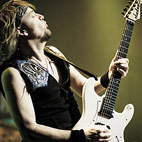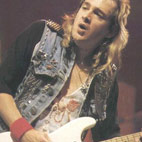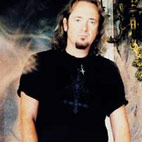Where: Backstage at the Long Beach Arena in Long Beach, California.
What: In the introductory essay of RC, two names were listed: Dave Murray/Adrian Smith. Iron Maiden’s twin guitar demons, of course. Well, it happened again. It’s not that I was unprepared exactly – batteries, cassettes, all tools accounted for. It’s that the location was a little lacking. Mark that as: could you have chosen a worse place to talk to them? And even that wasn’t completely my fault; it was more a function of "Where is the least noisiest place you could find backstage after a Maiden concert where everyone is yelling like banshees because they’ve just been adrenalin-rushed from the band’s grinding guitar marathon show?"
Answer? Nowhere. I think we retreated to some closed-off room somewhere but you could still hear the hundreds of people milling around and screaming, drinking, clinking glasses, and just generally creating a white noise roar. So, I set up the microphone and cassette player and I don’t remember if we’re sitting around a table or not. More likely the scenario was Adrian Smith was near the microphone and Dave Murray may have been sitting across the room somewhere. In any case, when I listened back to the tape, Murray’s voice was all but lost in the din of the backstage chaos. If you add to this the fact that his East London accent sounds like Greek to a boy from the west coast of the US, you have all the makings for a conversational disaster. We had one. Murray’s voice is there and someday I might sit down and try and transcribe what sound like murmurs and grunts, assents and dissents. For now, however, you’re stuck with Adrian Smith and what he had to say.
I did this interview in 1982. I’d been interviewing people now for about 14 or 15 years – and I was still trying to get it right. I mean, if you measure me like you would a ballplayer, my average of hits (well-recorded interviews) to strikeouts (poorly-documented interviews as represented here) is legendary great. I’m up around .850. But, I know I can only be measured interview-by-interview and for those of you who wanted to hear what both of these Maiden guitarheads were going to say, I apologize.
For now, we’re stuck with a single Maiden – and for most of you, that should be enough.
I also wanted to note that the Vinnie Vincent Invasion opened the show. Vinnie Vincent, nee Cusano, was the guitarist in Kiss for a brief period from 1982 – 1983. He played on the Creatues Of The Night and Lick It Up albums and appeared on a series of compilation sets. In 1986, he released the first album flying his own band moniker, The Vinnie Vincent Invasion, and followed this in 1988 with All Sytems Go.
I’d met Vinnie several years earlier through my close friend, Jimmy Waldo (you may recognize that name from the Yngwie Malmsteen story in this 80s era collection). The Bridgeport, Connecticut-born guitarist was truly one of the unsung heroes of the day. He possessed a unique and musical style and could move from straight-up muscular rock jams to a very kind of melodic and rhythmic approach. He excelled as a songwriter, having co-written "Tears" for John Waite and a number of other pretty successful songs. He was even a staff songwriter for the Happy Days television show.
So, Vinnie was walking around and hanging out and that was cool.
And my final recollection of that night was that a band called Riot opened the show. No, not Quiet Riot, but a metal band formed in New York circa 1975. I have a tape labeled "Riot" and I’m pretty certain I interviewed them this same evening. But I could be wrong. I do know that Iron Maiden played at the Long Beach Arena for several consecutive nights, so it’s possible I came back to interview Riot on a different night. Though the idea that I would have driven from Hollywood to Long Beach (a nasty 45-minute drive) simply to interview Riot – and no offense to them – seems a tad unrealistic.
_______________________________________________________________________________

"On the album I just use one guitar. I usually find that one works consistently well."
Did you use all 3 today?
Yeah; I changed just about every song, just to make sure it’s in tune.
Do you do the same type of thing for recording?
No, on the album I just use one guitar. I usually find that one works consistently well.
What did you use mainly for the last record (this would have been their sixth album, Somewhere In Time)?
The Ibanez.
What is it about the Ibanez that you like?
The pickups are very good. With the Ibanez, we have 2 pickups. They’re very powerful and I prefer the sound to like Dimarzio or even Gibson. That particular guitar, it sounds great.
Did the band want 2 lead guitar players as opposed to one rhythm player and one lead guitarist?
I think they’ve always had 2 guitarists. Dave has been in it from the beginning. I’ve worked with Dave in other bands before. So we knew each other and each other’s playing. When the job came up, I just got in touch with him. So we already had a rapport.
How would you characterize the 2 styles of playing?
Dave grew up with a lot of Hendrix. You go down to his house anytime and he’ll be playing that. So his approach is wah wah and lots of whammy bar, very, very fast. I tend to, when I do a solo in the studio, I’ll just like work it out. Then I’ll put it down and maybe I’ll keep it. Dave will just rip it out 3 or 4 at once.
So for those fast kinds of solos…
Dave does those more.
You do more melodic things?
Yeah, it strikes a nice contrast, as opposed to having 2 players going bananas.
Did the band listen to bands like Deep Purple and Led Zeppelin?
I would say everyone in the band grew up in the early 70s with bands like Free, Sabbath, those sorts of bands. They were big influences.
What does Iron Maiden do differently than, say, Black Sabbath?
I think we sound different. For starters, the bass is very prominent in this band. He has a very unique sound. He writes a lot of the songs. He sits down and he works on, and that’s a normal thing that you do on a guitar. So it’s just little things like that.
Does an Iron Maiden song come out of a riff that someone might play?
I don’t know. We just get a basic idea and then you just sit down quietly and go through it. You see what’s working. Then you get into the studio and you play it together. That’s when it starts coming alive and you can really see what’s going on.
You really work out songs in the studio?
Not recording studio. I mean, rehearsal studio. Very rarely. It can get expensive when you start working on songs in the studio.
Does the band tend to work pretty fast in the studio?
Yeah. I think we put the backing tracks to the last album just under 2 weeks. And all together, I think we put a couple more weeks on to it for the solos and the vocals.

"It can get expensive when you start working on songs in the studio."
What’s it like working with Martin Birch?
Great. He doesn’t try to make it a Martin Birch album. The very first thing he said to us was, “This is your album. I’m just going to try and bring out what’s there.” He’s not too pushy or he doesn’t try changing the songs. He just gets a good sound and then we just get on with it. If we start slacking, he kicks us then!
Was he someone you specifically wanted to work with?
Yeah. We had a few people in mind that we wanted to approach, but friends knew Martin. So we met him and he came by to see us play. So I think he’s going to do the next one. We might even do it in Los Angeles’ Record Plant. We don’t really know yet.
Is that for tax reasons?
No musical reasons, of course.
You were aware of the stuff that Martin had done before?
Oh, yeah. Sabbath. Some of his albums with Sabbath.
And the Deep Purple albums?
Yeah, the Purple albums.
Would he physically help to get the guitar sounds?
Oh, sure. Yeah. But you’ve got to work together at it. So we spent about 2 days and nights as well, just sitting out and working it out. He was in there, and that’s really important. We would be sitting there, just having a break, and then we’d start talking about going over this bit.
Did he do anything special for guitar sounds?
I think we just did the backing tracks with just 2 mics, 1 close mic and 1 far away screened off because there were 3 of us. That’s the only drawback to the studio we used. It wasn’t very versatile. You had 1 live room with a drum room, and 1 just studio. Yeah, but he used different effects. I don’t know exactly what he used.
On the back of the album it says, “Thanks to KISS, Priest, and UFO.” Any special reason?
I think because we just did tours with them. We did Kiss in Europe. I did about a 20-day tour with Kiss in Europe. We did about 2 months with Priest when I was here in the States. So we’ve toured with them.
Do you feel comfortable on a bill like this one?
Yeah. We just have got to do the show.
It must be a nice gig for the band.
Oh, it is. It’s great.
What does the band do next?
We’ll be touring over here until August. Then we go back to England to the Reading Festival, which we’re headlining. Then we’re coming back out here for about another 2 months with The Scorpions. Then we’re going to Japan in about November. Then we go back to Europe, or possibly back here. We don’t know yet. Some time in the winter, we’re going the album after Christmas.

"You always get a lot of bands coming out with a new style, and you get 2 or 3 really good bands and maybe they’ll carry on."
Are there any songs that might veer away from what you’ve done in the past?
I don’t know. It’s hard to say yet. It’s still in the early stages yet. You don’t really know until you start cranking them out.
Is the current state of English metal one that embraces what the band is doing?
There are a lot of different things happening in London. In England, it changes so quick. You always get a lot of bands coming out with a new style, and you get 2 or 3 really good bands and maybe they’ll carry on. They’re there when everyone else has sort of fallen behind. But as to our music, it never really sinks, like Cream. It has never really sort of gone away. It’s always had its fans. It just got pushed in the background for a bit, but there is still a big audience for it.
Are you a fan of Cream?
It was a bit before my time. I couldn’t call myself a fan because I wasn’t really aware of it when it was going on, but there are some good songs.
Interview by Steven Rosen
Ultimate-Guitar.Com © 2009
SOURCE
No comments:
Post a Comment